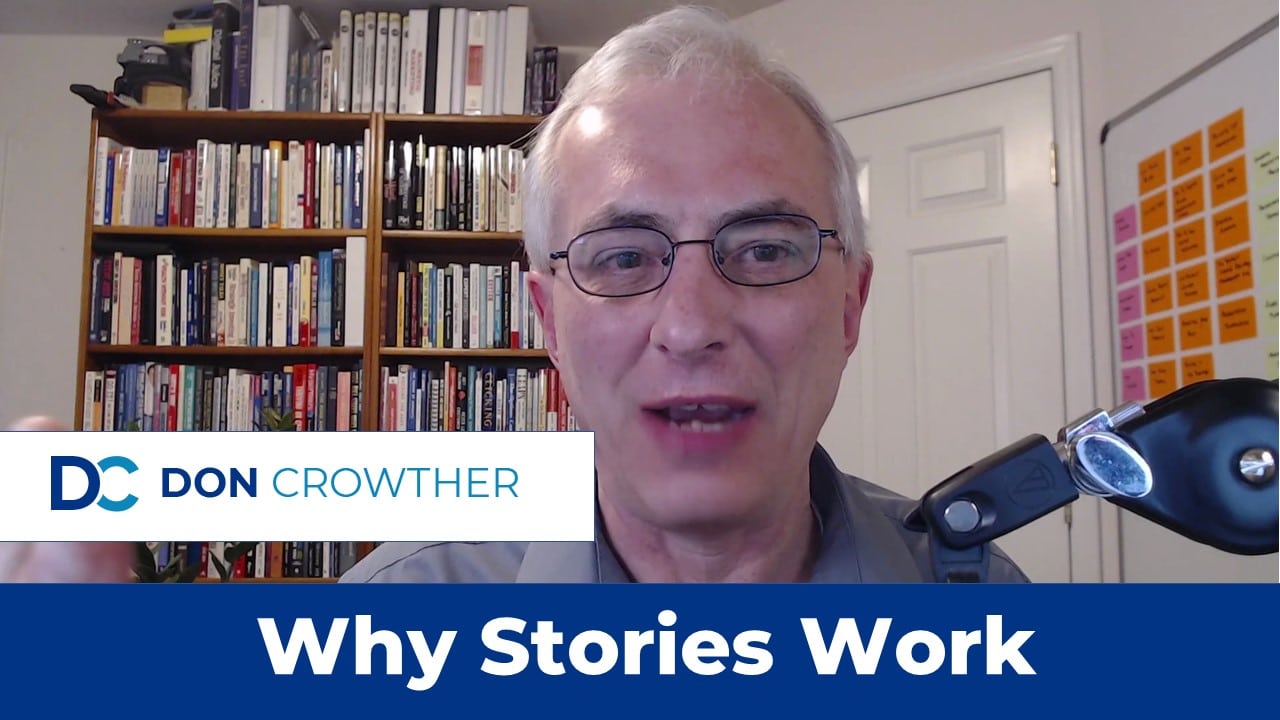We all know that stories are powerful elements in the marketing and selling process. But have you ever asked yourself “exactly why do they work so well?” That’s an important question to answer because when we understand these factors, we can then craft our stories to be even more powerful.
I was thinking about my high school days today. I had a class that I took every year for the three years of high school. And across those three years I had probably 5 different teachers in that class.
As I think about it I can absolutely tell you which one of those teachers was my favorite and why.
So my favorite was a man named Tim Carver. I always loved him for one specific reason – he was an amazing storyteller and he had a lot of them. He was constantly sharing funny and entertaining stories that took us into his world when he was in high school and applied what he was teaching us to our lives by showing how they had applied in his when he was our age.
And as I was thinking about his class, I started wondering, what is it about stories that make them so powerful?
I’ve got lots of books stories and the art of telling stories. But I sometimes think that we don’t do a good enough job of thinking clearly about why they work so well. Because when we understand the reason stories work we can then use that knowledge to structure our stories so they’re even more powerful.
Here are my three reasons why I believe stories are so powerful.
1. Stories create emotion.
And when those emotions start firing off in our brains all kinds of amazing things happen that make all the other reasons why stories work possible.
If you think about it for a minute, unless you’re a math and science type of person, I bet that not one of your math classes will go down in your personal hall of fame as being your favorite class.
One of the major reasons that is true is because math teachers, at least the ones I had, rarely tell stories.
They want to show you data. They want to show you algorithms, they want to show you proofs, they want to show you all those things.
So, they never trigger the positive emotions that other teachers do. There’s very little emotion that happens in a math classroom other than failure. Now I realize if I was great in math, I might have had more successful emotional experiences in those classrooms, but for me, the primary emotion that happened to me in algebra class was failure. Failure isn’t the powerful emotion that make me identify that classroom as one of my favorites.
When we think about the power of the all those good chemicals that fire off in our brains that are connected with stories, that’s the foundation of the power that runs through all of these elements that make stories so valuable.
2. The connection that happens with stories.
As I mentioned above I am not going to connect to you by showing you data.
Even if I show you data in a very motivational style, if I get really excited about the data, you’re probably still not going to remember the data as much as if I tell you a story that illustrates the point that data represents.
That’s where that connection happens, and that connection is oftentimes related to stories or remembered experiences.
My guess is that if you think back to one of your favorite relatives who has now passed on, the thing you’re probably remembering are the connections and experiences you had together – connections that can only be communicated through the power of stories.
Every time you remember them, your mind experiences the story of those times together, and the emotions fire off again in your brain.
3. Application
Stories do a much better job than anything else of showing how things apply in peoples’ lives.
As we are trying to teach people, the most powerful way to teach them is not to say “you’re going to need this someday when you are in this situation.” The probability that they will actually successfully apply what you’re teaching them to their life (and therefore, remember and actually use it) is to tell them a story about how it can apply in their life.
Think back to my teacher, Tim Carver. His teachings stuck with me because he told stories about how those principles applied in his life in a way that was so visual and visceral to me that I totally understood how they could apply in my own life.
To illustrate the opposite, consider my algebra class for a minute. I distinctly remember constantly raising my hand and asking, “how does this apply to buying something at Kmart?” And she not only disdained that question, she refused to answer it.
I kept asking for application. She kept not being willing or maybe not even able to give me application, which may be one of the reasons why I didn’t do all that well in that class.
So, those are the top three things that make stories work, in my opinion: emotion, connection, and application.
How can we use those to amplify the power of our stories?
Anytime you tell a story, I encourage you to keep those three things in mind.
- How can I put some more emotion into this story? Or how can I tell a different story to illustrate this point that will incite the emotion I want them to have?
- How can I use this story to create a connection with them?
- How can I illustrate the application of what I’m trying to teach or share with my listeners in a way that will cause them to envision themselves using it in their own lives?
As you focus on these three aspects of story your stories go from normal to amazing.
Their relationship with you goes from normal relationship to amazing.
And everything you teach becomes significantly more useful and powerful in their lives as they apply it to their lives.
Just like my teacher, my friend, Tim Carver, who taught me that class at least 40 years ago, yet I still remember him and I still value the relationship that was created there.
All because Tim told stories and he told them well.
Think about it.
How can you use this to improve the quality of your teaching and your life?
This is Don Crowther, just go do this stuff.



An amazing nugget of wisdom. Thank you!
Data Stories
Hi Don! People remember stories!
Yep they do! Thanks for watching Mary Lynch Barbera!